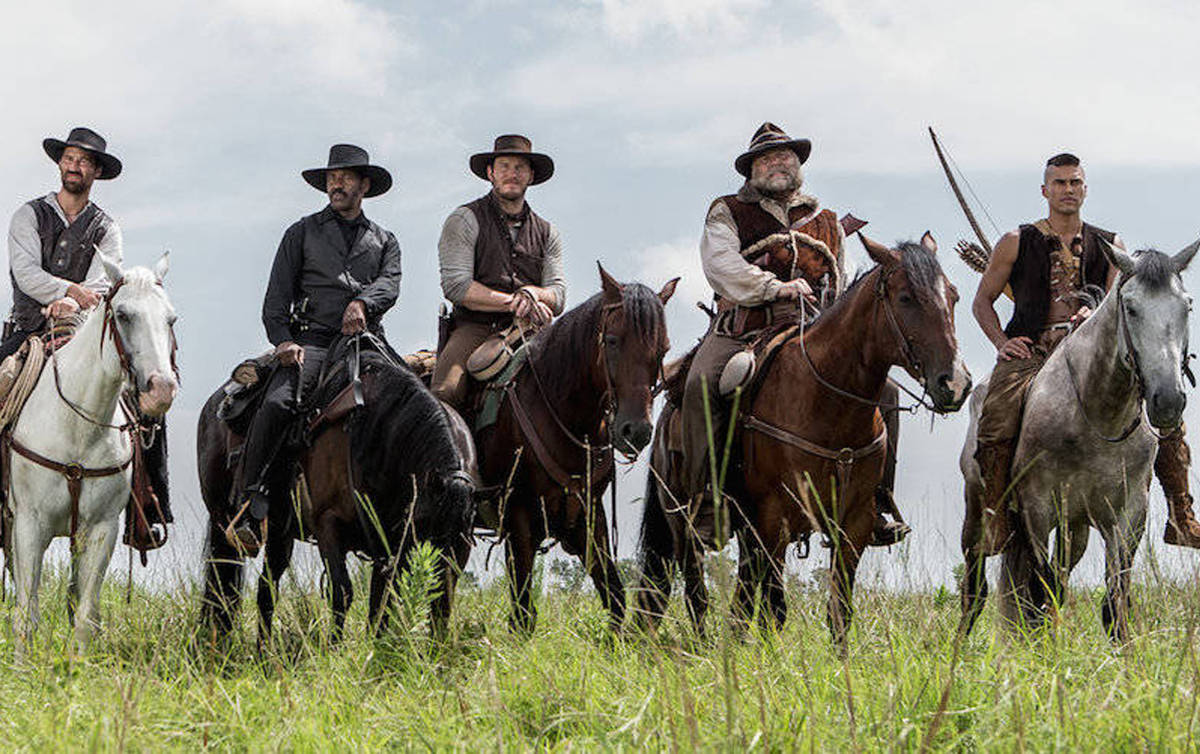Movie Review: “The Magnificent Seven” (PG-13)
![]() “Training Day” director Antoine Fuqua is back with a remake of the famed John Sturges epic from 1960, which itself was a remake of Akira Kurosawa’s brilliant “7 Samurai” from 1954. How does this version measure up? Well, it’s far from bad, but it doesn’t exactly set the western genre ablaze, either. It’s a real shame, because this thing has a lot of talent behind it. In the end, though, this take on “The Magnificent Seven” sort of plays like a western version of “Suicide Squad,” which is interesting considering that that picture was directed by “Training Day” screenwriter David Ayer. But while “The Magnificent Seven” might make more sense then the much talked-about “Suicide Squad,” the DC-Villain-on-a-mission flick benefited from more lively characterizations and stronger cast chemistry.
“Training Day” director Antoine Fuqua is back with a remake of the famed John Sturges epic from 1960, which itself was a remake of Akira Kurosawa’s brilliant “7 Samurai” from 1954. How does this version measure up? Well, it’s far from bad, but it doesn’t exactly set the western genre ablaze, either. It’s a real shame, because this thing has a lot of talent behind it. In the end, though, this take on “The Magnificent Seven” sort of plays like a western version of “Suicide Squad,” which is interesting considering that that picture was directed by “Training Day” screenwriter David Ayer. But while “The Magnificent Seven” might make more sense then the much talked-about “Suicide Squad,” the DC-Villain-on-a-mission flick benefited from more lively characterizations and stronger cast chemistry.
In “The Magnificient Seven,” fierce gunslinger/bounty hunter Sam Chisolm (Denzel Washington) rounds up a team of exceptionally tough men, including charismatic Josh Faraday (Chris Pratt), sharpshooter Goodnight Robicheux (Ethan Hawke), mysterious Billy Rocks (Byung-hun Lee), lumbering Jack Horne (Vincent D’Onofrio), warrior Red Harvest (Martin Sensmeier), and jokester Vasquez (Manuel Garcia-Rulfo) so that they might band together and aid a town of commoners in taking down villainous industrialist Bartholomew Bogue (Peter Sarsgaard) after the spineless outlaw runs the god-fearing individuals out of their own town.
“The Magnificent Seven” isn’t without its strengths. It’s a revenge story overflowing with star appeal, and Fuqua does mount a handful of fittingly entertaining old-school gunslinging sequences. Furthermore, while this movie certainly winks at all the glorious epic westerns of the past, “The Magnificent Seven” also serves as a metaphor for war. And it goes beyond an all too brief but vital bit of backstory involving Chisolm and Robicheux. These men initially agree to aid the town for a price, but they’re really doing it because they know it’s the right thing to do. They’re doing it to help those who have a difficult time helping themselves. Does Chisolm have another reason for taking on such a seemingly impossible task? Perhaps, but this potential reason certainly isn’t at the forefront of the movie.
“The Magnificent Seven” also touches on issues of race, but it deals with these issues in a refreshingly low-key manner. Translation: It doesn’t explore these issues in the same way that Quentin Tarantino brilliantly explored them in “Django Unchained” and “The Hateful Eight,” but then, this is an entirely different kind of movie.
Having said all of that, “The Magnificient Seven” isn’t quite cheeky, playful, or self aware enough to play like “The Quick and the Dead” or “Back to the Future Part III,” and it’s not quite serious, dramatic, or authentic enough to play like “Unforgiven,” “Open Range,” or that outstanding “3:10 to Yuma” remake from a years ago. No, this “Magnificent Seven” is stuck somewhere inbetween. The recognizable is in place. There’s plenty of homage on display, and it’s clear that Fuqua is a fan of the genre, evident by the breathtaking backdrops, the shanty old towns, the nifty gunslinging, and the raucous adventure of it all, but too often this film feels like a pale imitation of better westerns.
Heck, I’m a fan of flashy, slick westerns brimming with star power. I’m even an unabashed fan of the much dated “Young Guns” movies. Unfortunately, there’s something amiss in “The Magnificent Seven.” Again, it has the star appeal and it has the production value, but despite a pretty exciting finale, the film is a bit lacking in depth, and the pacing is a little off. The currently released modern western gem “Hell or High Water” is more worthy of your time and money.




